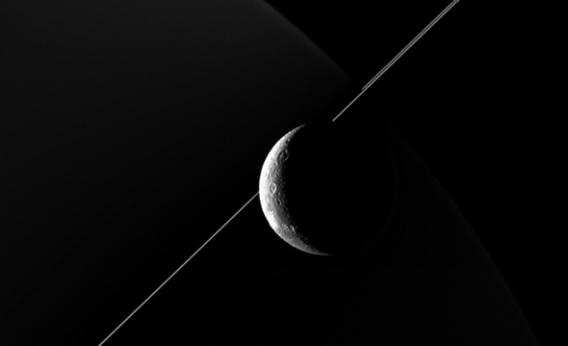Create a free profile to get unlimited access to exclusive videos, sweepstakes, and more!
Dione, Mother of Beauty

The Cassini mission is nearing its planned end after more that a decade orbiting Saturn. But it’s not over yet; in mid-June it took this spectacular shot of the icy moon Dione:
The Sun is off to the left, so Dione is a crescent. You can get a hint at how battered and cratered its surface is. Looming behind it like a gigantic specter is Saturn itself, with its rings seen nearly edge on. We’re seeing the night side of Saturn here, unlit by direct sunlight … so what’s that glow above Dione?
It’s ringlight! The rings are broad and reflective, and from that part of Saturn they would sweep across the night sky, providing illumination in the same way the full Moon does on Earth. Imagine what that must look like …
The tiny moon you can see to the upper right is Enceladus, the water-spewing moon that has been the center of so much attention lately. Dione orbits once for every two times Enceladus orbits Saturn. This is called a resonance, specifically a 2:1 resonance, and these are common in moons orbiting the giant planets. Usually this means the moons tug on each other and change their orbits over time, but in some rare cases it actually helps stabilize the orbits, which is the case here.
This shot is surreally beautiful. Fitting, too: In mythology, Dione was the mother of Aphrodite, the goddess of beauty.
This is the penultimate visit of Dione by Cassini; there will be one more close pass in August (shaving the moon by a mere 474 kilometers). This is a common theme with encounters now; the Cassini end of mission is planned for September 2017, when it will dive into Saturn’s atmosphere and burn up. This is a standard practice for planetary orbiters at the mission end, to prevent them from crashing into a moon and possibly contaminating it. Even as it plunges in, it will send back data on the planet’s atmosphere, giving humans one last chance to learn another scientific nugget of information about Saturn.
It’ll go down doing its duty one final time. A noble end.


























